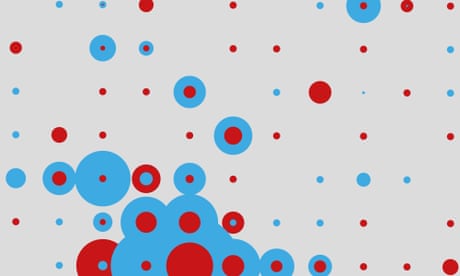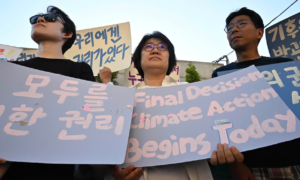Experts call for legislation and trade deals worldwide to encourage green recovery
Pandemics such as coronavirus are the result of humanity’s destruction of nature, according to leaders at the UN, WHO and WWF International, and the world has been ignoring this stark reality for decades.
The illegal and unsustainable wildlife trade as well as the devastation of forests and other wild places were still the driving forces behind the increasing number of diseases leaping from wildlife to humans, the leaders told the Guardian.
Coronavirus is a warning to us to mend our broken relationship with nature
Marco Lambertini, Elizabeth Maruma Mrema and Maria Neira Read more
They are calling for a green and healthy recovery from the Covid-19 pandemic, in particular by reforming destructive farming and unsustainable diets.
A WWF report, also published on Wednesday, warns: “The risk of a new [wildlife-to-human] disease emerging in the future is higher than ever, with the potential to wreak havoc on health, economies and global security.”
WWF’s head in the UK said post-Brexit trade deals that fail to protect nature would leave Britain “complicit in increasing the risk of the next pandemic”.
High-level figures have issued a series of warnings since March, with the world’s leading biodiversity experts saying even more deadly disease outbreaks are likely in future unless the rampant destruction of the natural world is rapidly halted.
Earlier in June, the UN environment chief and a leading economist said Covid-19 was an “SOS signal for the human enterprise” and that current economic thinking did not recognise that human wealth depends on nature’s health.
“We have seen many diseases emerge over the years, such as Zika, Aids, Sars and Ebola and they all originated from animal populations under conditions of severe environmental pressures,” said Elizabeth Maruma Mrema, head of the UN convention on biological diversity, Maria Neira, the World Health Organization director for environment and health, and Marco Lambertini, head of WWF International, in the Guardian article.

Coronavirus: the week explained – sign up for our email newsletter
Read more
With coronavirus, “these outbreaks are manifestations of our dangerously unbalanced relationship with nature”, they said. “They all illustrate that our own destructive behaviour towards nature is endangering our own health – a stark reality we’ve been collectively ignoring for decades.
“Worryingly, while Covid-19 has given us yet another reason to protect and preserve nature, we have seen the reverse take place. From the Greater Mekong, to the Amazon and Madagascar, alarming reports have emerged of increased poaching, illegal logging and forest fires, while many countries are engaging in hasty environmental rollbacks and cuts in funding for conservation. This all comes at a time when we need it most.
“We must embrace a just, healthy and green recovery and kickstart a wider transformation towards a model that values nature as the foundation for a healthy society. Not doing so, and instead attempting to save money by neglecting environmental protection, health systems, and social safety nets, has already proven to be a false economy. The bill will be paid many times over.”

The WWF report concludes the key drivers for diseases that move from wild animals to humans are the destruction of nature, the intensification of agriculture and livestock production, as well as the trading and consumption of high-risk wildlife.
The report urges all governments to introduce and enforce laws to eliminate the destruction of nature from supply chains of goods and on the public to make their diets more sustainable.
Beef, palm oil and soy are among the commodities frequently linked to deforestation and scientists have said avoiding meat and dairy products is the single biggest way for people to reduce their environmental impact on the planet.
Tanya Steele, the head of WWF UK, said the post-Brexit trade deals must protect nature: “We cannot be complicit in increasing the risk of the next pandemic. We need strong legislation and trade deals that stop us importing food that is the result of rampant deforestation or whose production ignores poor welfare and environmental standards in producer countries. The government has a golden opportunity to make transformative, world-leading change happen.”
The WWF report said 60-70% of the new diseases that have emerged in humans since 1990 came from wildlife. Over the same period, 178m hectares of forest have been cleared, equivalent to more than seven times the area of the UK.
We’ve never had a better chance …
… to make a greener world. Covid-19 has delivered unusual environmental benefits: cleaner air, lower carbon emissions, a respite for wildlife. Now the big question is whether we can capitalise on this moment. The Guardian aims to lead the debate from the front.
In the weeks and months ahead, our journalism will investigate the prospects for a new green settlement. We will showcase the big thinkers and protagonists and amplify the arguments for authorities everywhere to consider as they lead us out of coronavirus.
Our credentials suit us well to the task: we are independent, we have no owners, no paymasters or oligarchs pulling the strings. We have committed to carbon neutrality by 2030, divested from the oil and gas sectors and renounced fossil fuel advertising. But at this crucial moment, news organisations like ours are facing a daunting financial challenge. As businesses everywhere feel the pinch, the advertising revenue that has long helped to sustain our work has plummeted. We need you to help fill the gap.
You’ve read 5 articles in the last six months. Our journalism is open to all because we believe everyone deserves access to factual information, regardless of where they live or what they can afford to pay. If you can afford to, we hope you will consider supporting our journalism today.
The Guardian believes that the climate crisis we face is systemic. We will inform our readers about threats to the environment based on scientific facts, not driven by commercial or political interests. We will keep reporting on the efforts of individuals and communities around the world who are fearlessly taking a stand for future generations and the preservation of human life on earth. We want their stories to inspire hope.




